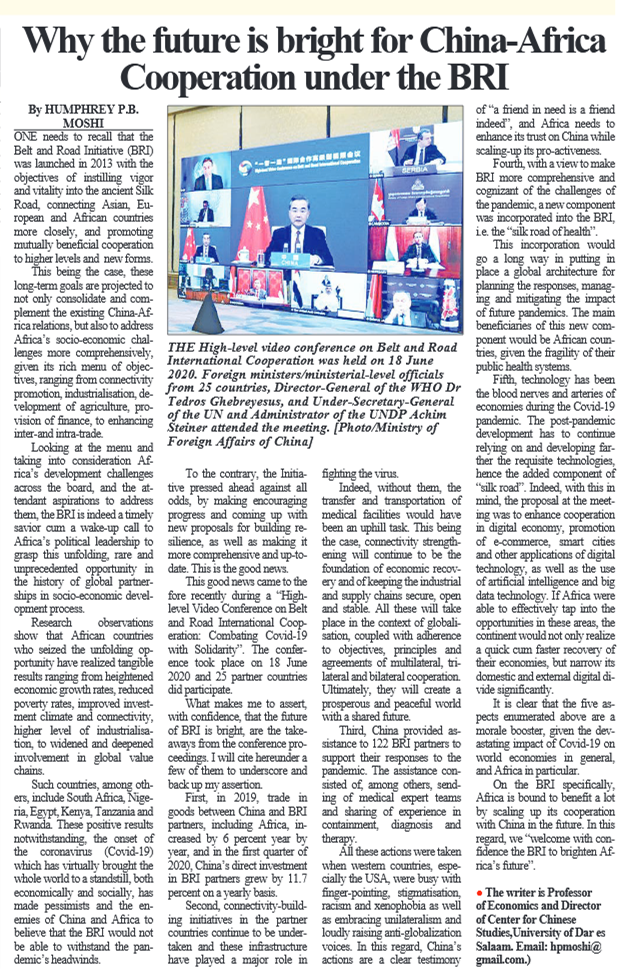Prof. Humphrey Moshi, Director of the Centre for Chinese Studies, University of Dar es Salaam published an article titled “Why the future is bring for China-Africa cooperation under the BRI” on Daily News on 2 July 2020. In the article, he called on Africa’s political leaders to grasp the unfolding, rare and unprecedented opportunity generated by the Belt and Road Initiative (BRI), in order to better address their development challenges. The below is the full text of the article.

Prof. Moshi’s article published by Daily News on 2 July 2020
One needs to recall that the Belt and Road Initiative (BRI) was launched in 2013 with the objectives of instilling vigor and vitality into the ancient Silk Road, connecting Asian, European and African countries more closely, and promoting mutually beneficial cooperation to higher levels and new forms. This being the case, these long-term goals are projected to not only consolidate and complement the existing China-Africa relations, but also to address Africa’s socio-economic challenges more comprehensively, given its rich menu of objectives, ranging from connectivity promotion, industrialization, development of agriculture, provision of finance, to enhancing inter- and intra-trade.
Looking at the menu and taking into consideration Africa’s development challenges across the board, and the attendant aspirations to address them, the BRI is indeed a timely savior cum a wake-up call to Africa’s political leadership to grasp this unfolding, rare and unprecedented opportunity in the history of global partnerships in socio-economic development process.
Research observations show that African countries who seized the unfolding opportunity have realized tangible results ranging from heightened economic growth rates, reduced poverty rates, improved investment climate and connectivity, higher level of industrialization, to widened and deepened involvement in global value chains. Such countries, among others, include South Africa, Nigeria, Egypt, Kenya, Tanzania and Rwanda. These positive results notwithstanding, the onset of the coronavirus (COVID-19) which has virtually brought the whole world to a stand-still, both economically and socially, has made pessimists and the enemies of China and Africa to believe that the BRI would not be able to withstand the pandemic’s headwinds. To the contrary, the Initiative pressed ahead against all odds, by making encouraging progress and coming up with new proposals for building resilience, as well as making it more comprehensive and up-to-date. This is the good news.
This good news came to the fore recently during a “High-level Video Conference on Belt and Road International Cooperation: Combating COVID-19 with Solidarity”. The conference took place on 18 June 2020 and 25 partner countries did participate.
What makes me to claim, with confidence, that the future of BRI is bright are the take-aways from the conference proceedings. I will cite hereunder a few of them to underscore and back up my claim.
First, in 2019, trade in goods between China and BRI partners, including Africa, increased by 6 percent year on year, and in the first quarter of 2020, China’s direct investment in BRI partners grew by 11.7 percent on a yearly basis.
Second, connectivity-building initiatives in the partner countries continue to be undertaken and these infrastructures have played a major role in fighting the virus. Indeed, without them the transfer and transportation of medical facilities would have been an uphill task. This being the case, connectivity strengthening will continue to be the foundation of economic recovery and of keeping the industrial and supply chains secure, open and stable. All these will take place in the context of globalization, coupled with adherence to objectives, principles and agreements of multilateral, trilateral and bilateral cooperation. Ultimately, they will create a prosperous and peaceful world with a shared future.
Third, China provided assistance to 122 BRI partners to support their responses to the pandemic. The assistance consisted of, among others, sending of medical expert teams and sharing of experience in containment, diagnosis and therapy. All these actions were taken when western countries, especially the USA, were busy with finger-pointing, stigmatization, racism and xenophobia as well as embracing unilateralism and loudly raising anti-globalization voices. In this regard, China’s actions are a clear testimony of “a friend in need is a friend indeed”, and Africa needs to enhance its trust on China while scaling-up its pro-activeness.
Fourth, with a view to make BRI more comprehensive and cognizant of the challenges of the pandemic, a new component was incorporated into the BRI, i.e. the “silk road of health”. This incorporation would go a long way in putting in place a global architecture for planning the responses, managing and mitigating the impact of future pandemics. The main beneficiaries of this new component would be African countries, given the fragility of their public health systems.
Fifth, technology has been the blood nerves and arteries of economies during the COVID-19 pandemic. The post-pandemic development has to continue relying on and developing farther the requisite technologies, hence the added component of “silk road”. Indeed, with this in mind, the proposal at the meeting was to enhance cooperation in digital economy, promotion of e-commerce, smart cities and other applications of digital technology, as well as the use of artificial intelligence and big data technology. If Africa were able to effectively tap into the opportunities in these areas, the continent would not only realize a quick cum faster recovery of their economies, but narrow its domestic and external digital divide significantly.
It is clear that the five aspects enumerated above are a morale booster, given the devastating impact of COVID-19 on world economies in general, and Africa in particular. On the BRI specifically, Africa is bound to benefit a lot by scaling up its cooperation with China in the future. In this regard, we “welcome with confidence the BRI to brighten Africa’s future”.